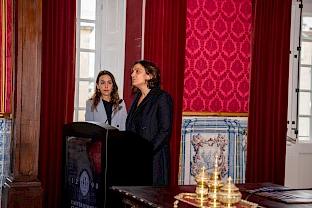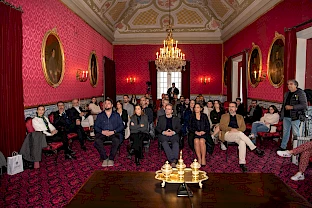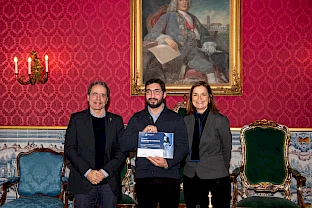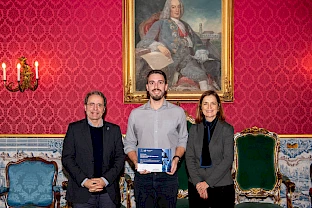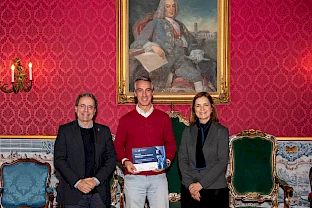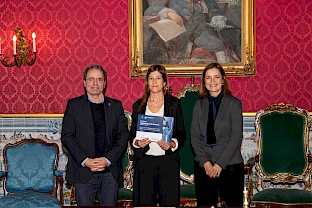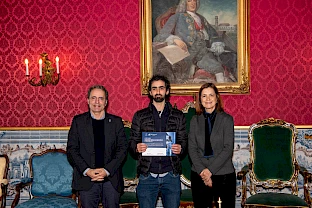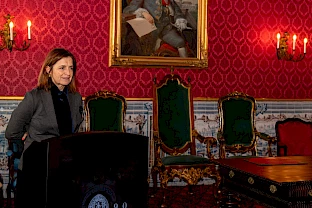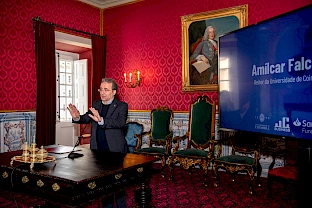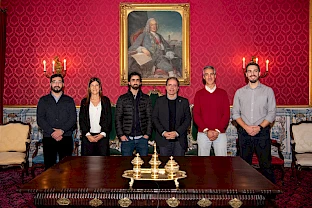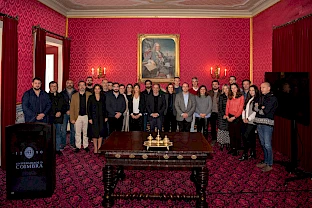The University of Coimbra awarded the prizes of the " UC Proof of Concept by Santander Foundation"
The awards ceremony took place at the UC Senate Hall on 17 December, with five projects receiving €20,000 each.
Organised by the University of Coimbra (UC) through the UC Business - Technology Transfer Division, with the support of the Santander Foundation, the "UC Proof of Concept by Santander Foundation" ' aims to recognise inventions with a high potential for innovation and market impact.
“These proofs of concept are essential for us to be able to take our research to another level and eventually reach the market, either by licensing the technology or creating companies," said the UC rector. Amílcar Falcão congratulated the winners, but also recognised the merits of the other participants: 'I would like to congratulate those who applied and did not win the prize, but who, I'm sure, will be successful in the future. These five awards have great potential, and if we manage to launch four or five products or services each year, it will be a great victory”.
During the awards ceremony, Gabriela Fernandes, UC Pro-Rector, emphasised the role of the initiative: 'Valuing scientific and technological knowledge is strategic for UC, which is why the University has adopted an active policy of encouraging and stimulating inventions by teachers, researchers and students. In 2023, the Rectorate decided to support five proofs of concept, each worth 20,000 euros, ensuring a significant evolution in the maturity of the winning technologies," she added.
Inês Rocha de Gouveia, Director of the Santander Foundation, expressed her pride in supporting the initiative: 'We believe that we should support everything related to innovation'. In this way, 'we have supported and rewarded the best talent at the University of Coimbra'. She added that "as UC is the oldest university in Portugal, this is an important milestone and it makes perfect sense for us to be the partner of this highly relevant institution".
This second edition of the competition received 21 applications, confirming the interest of the University of Coimbra in the promotion of scientific innovation, and its central role in the valorisation and transfer of knowledge to the market.
Winning projects of the 2024 'UC Proof of Concept by Santander Foundation'
TIMEUP - Responsible: Susana Alarico
- TimeUp is a medical diagnostic device designed to identify uropathogens to prevent catheter-associated urinary tract infections (CAUTIs), a global health problem. This allows for early detection, even before symptoms appear, without the need for sample collection for lab testing, thus reducing the time, costs, and resources involved in the process. TimeUp exceeds conventional standards by enabling real-time urine monitoring through the urinary catheter, detecting bacteria before an infection progresses. Current solutions are costly or depend on patient symptoms and laboratory tests that consume time and resources. TimeUp’s approach is faster, providing early and specific detection, allowing proactive measures by healthcare professionals or even patients to prevent infections.
VEST - Responsible: Mahmoud Tavakoli
-
VEST is a platform for non-invasive wireless neuroscience. This technology has significant potential in behavioural neuroscience, with an initial focus on optogenetics. Optogenetics holds great promise for curing blindness and treating neurological diseases such as Parkinson's and Alzheimer's. Optogenetics offers advantages over electrical stimulation such as less invasiveness and greater cellular specificity. These advantages have allowed behavioural scientists to probe the brain with unprecedented selectivity.
MFIBRO - Responsible: Filipe Rodrigues
- Mfibro is an mRNA technology aimed at restoring the function of organs that cannot be regenerated. This technology is at TRL 3, reflecting proof of concept of the formulation's selectivity in delivering mRNA to fibroblasts in an animal model, as well as in vitro evidence of reduced fibrotic activity in fibroblasts isolated from rat spinal cord. These fibroblasts respond to ECM by inducing collagen production to encapsulate the area and protect it from further damage. Our mRNA formulation technology, which encodes a protein, reduced proliferation and collagen production by 60% in fibroblasts activated with pro-fibrotic factors.
ISENSE4FOOD - Responsible: Cláudio Almeida
- ISense4Food: Integrated sensor system for the assessment of food freshness. To improve the detection capacity and reliability, the combination of several probes in a single sensor results in a combined response that allows for a more accurate detection. The subsequent digitisation, providing quantitative information to the operator, would make this technology highly applicable.
REVERSE - Responsible: Hugo Fernandes
- REVERSE: Restoring ß-cell function by engineering extracellular vesicles with microRNAs. Monitoring the expression levels of these miRNAs will help identify patients at high risk of developing diabetes, opening up the possibility of initiating treatment at an asymptomatic stage.

